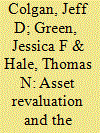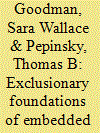| Srl | Item |
| 1 |
ID:
178578


|
|
|
|
|
| Summary/Abstract |
Whereas scholars have typically modeled climate change as a global collective action challenge, we offer a dynamic theory of climate politics based on the present and future revaluation of assets. Climate politics can be understood as a contest between owners of assets that accelerate climate change, such as fossil fuel plants, and owners of assets vulnerable to climate change, such as coastal property. To date, obstruction by “climate-forcing” asset holders has been a large barrier to effective climate policy. But as climate change and decarbonization policies proceed, holders of both climate-forcing and “climate-vulnerable” assets stand to lose some or even all of their assets' value over time, and with them, the basis of their political power. This dynamic contest between opposing interests is likely to intensify in many sites of political contestation, from the subnational to transnational levels. As it does so, climate politics will become increasingly existential, potentially reshaping political alignments within and across countries. Such shifts may further undermine the Liberal International Order (LIO); as countries develop pro-climate policies at different speeds and magnitudes, they will have incentives to diverge from existing arrangements over trade and economic integration.
|
|
|
|
|
|
|
|
|
|
|
|
|
|
|
|
| 2 |
ID:
178567


|
|
|
|
|
| Summary/Abstract |
Analyses of embedded liberalism have focused overwhelmingly on trade in goods and capital, to the exclusion of migration. We argue that much as capital controls were essential components of the embedded liberal compromise, so too were restrictions on the democratic and social rights of labor migrants. Generous welfare programs in labor-receiving countries thrived alongside inclusionary immigration policies, but this balanced arrangement was only tenable if migrants were politically excluded in their destination countries. That is, embedded liberalism abroad rested on exclusionary political foundations at home. In bringing together the IPE literature on the “globalization trilemma” with the comparative politics of citizenship, we provide a novel account of how embedded liberalism worked politically, with implications for current debates about the fate of the liberal order in a time of populist resurgence.
|
|
|
|
|
|
|
|
|
|
|
|
|
|
|
|